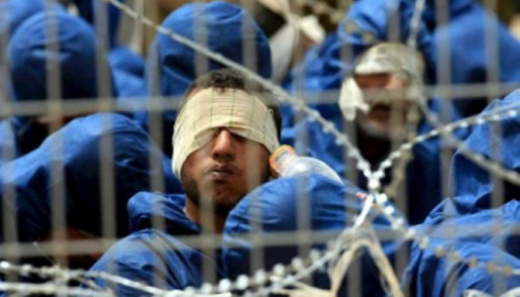- About
- News
-
Advocacy
- Accountability & Litigation
- International Advocacy
- National Advocacy
- Documentation
- FAI Unit
- Al-Haq Publications
- Library


- About
- News
-
Advocacy
- Accountability & Litigation
- International Advocacy
- National Advocacy
- Documentation
- FAI Unit
- Al-Haq Publications
- Library

 Jaffa-Ramallah, 19 July 2012 – Addameer, Al-Haq and Physicians for Human Rights-Israel (PHR-IL) reiterate their utmost concern for the lives of the Palestinian prisoners currently on hunger strike in Israeli prison, especially for gravely-ill prisoner Akram Rikhawi who is on his 99th day of hunger strike today.
Jaffa-Ramallah, 19 July 2012 – Addameer, Al-Haq and Physicians for Human Rights-Israel (PHR-IL) reiterate their utmost concern for the lives of the Palestinian prisoners currently on hunger strike in Israeli prison, especially for gravely-ill prisoner Akram Rikhawi who is on his 99th day of hunger strike today.
According to Akram’s wife after speaking to lawyers who visited him, his health continues to deteriorate. Akram is now unable to move his left leg and left hand and can only move with a wheelchair. Two days ago, Akram attempted to stand and immediately fell to the ground and struck his head. He was taken to Assaf Harofeh Hospital and then returned to Ramleh prison medical clinic. He is currently consuming water, salt and vitamins. Akram, who suffers from diabetes, asthma and osteoporosis, remains on hunger strike, demanding his immediate release due to his medical condition.
Administrative detainee Samer Al-Barq is on his 59th day of renewed hunger strike today, following a prior 30-day hunger strike. Israel continues to refuse to release him to his home in the West Bank. PHR-IL lawyer Mohammad Mahagni visited Samer in Ramleh prison medical clinic this morning. Samer reported that his health has severely deteriorated. He noted that three weeks ago, his heart rate had dropped to 35 beats per minute, which is an alarming and life-threatening state. He was then transferred to Assaf Harofeh Hospital for one night, during which he was shackled by three limbs to the hospital bed. Samer also reported that the Israeli Prison Service is threatening him with force-treatment or force-feeding if he does not break his hunger strike. Samer currently suffers from vertigo, drastic weight loss and involuntary shivering and coldness in his legs, symptoms that may indicate peripheral nerve damage.
Hassan Safadi is on his 29th day of renewed hunger strike today, following his 71-day hunger strike in protest against his administrative detention. According to Hassan’s family, last week he stopped drinking water for two days and was subsequently taken to Assaf Harofeh Hospital due to rapid deterioration in his health. He is now back in Ramleh prison in solitary confinement, where he awaits a hearing on 25 July. This hearing may determine whether or not his new administrative detention order is upheld, given that he was included in the agreement to end Palestinian prisoners’ mass hunger strike and should have been released on 21 June.
While administrative detention is allowed under international humanitarian law, it must be used only under exceptional circumstances as it infringes upon basic human rights, including the right to a fair trial. Indeed, the denial of a fair trial constitutes a ‘grave breach’ of the Fourth Geneva Convention. Furthermore, the European Parliament called on Israel in a September 2008 resolution to “guarantee that minimum standards on detention be respected, to bring to trial all detainees, [and] to put an end to the use of ‘administrative detention orders’.” The United Nations Human Rights Committee has stated several times that prolonged administrative detention is likely to result in the exposure of detainees to “torture, ill-treatment and other violations of human rights.”
A fourth hunger striker, Ayman Sharawna, is on his 19th day of hunger strike today. Ayman was released in the prisoner exchange deal last October, only to be re-arrested on 31 January. No charges have been filed against him. Ayman is currently being held in solitary confinement in Rimon prison.
An Addameer lawyer submitted a request to visit the hunger strikers in Ramleh prison medical clinic and was not given permission until Monday, 23 July. All current hunger strikers are still denied access to independent doctors. Two appeals will be submitted tomorrow by PHR-IL to the District Court regarding entry of doctors to Akram and Samer.
In light of the further deterioration of the conditions of the remaining Palestinian prisoners on hunger strike, Addameer, Al-Haq and PHR-IL urge the international community to immediately intervene on their behalf and demand:
- unrestricted access for independent physicians to all hunger strikers;
- the immediate transfer of Akram Rikhawi and Samer Al-Barq to a public hospital, and the transfer of all prisoners on hunger strike for more than 40 days to public hospitals;
- that no hunger striker be shackled while hospitalized;
- that all hunger strikers—especially those in advanced stages of hunger strike—be allowed family visits, while they are still lucid;
- that all information be given to families as to the medical condition of their loved ones, which is the responsibility of hospitals and medical staff in accordance with standards of medical ethics;
- that Akram Rikhawi be granted release on humanitarian grounds;
- that Hassan Safadi and Samer Al-Barq, along with all other administrative detainees, be immediately and unconditionally released;
- that the European Parliament immediately dispatch a parliamentary fact-finding mission that includes members of its Subcommittee on Human Rights to investigate the conditions of detention of Palestinians held in Israeli prisons.
ends
 |
 |
 |
|||